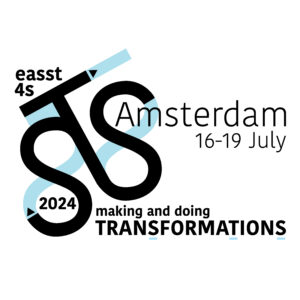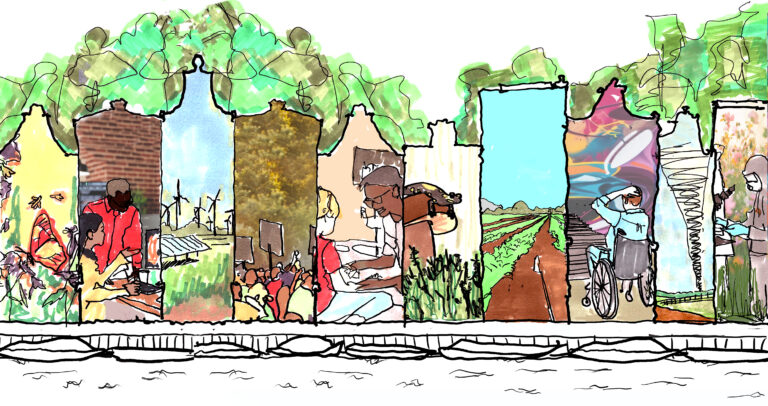 Teun Zuiderent-Jerak, Michiel van Oudheusden, Barbara Regeer (conference co-chairs)
Teun Zuiderent-Jerak, Michiel van Oudheusden, Barbara Regeer (conference co-chairs)
EASST/4S: Flowing from and back to Amsterdam
It was a steaming hot summer in Madrid. The choice to meet again as a community of STS scholars for the first in-person EASST conference post-lockdowns had clearly been a brave one: walking down the long route through the deserted conference centre signaled how few collectives had dared to plan ahead like this in uncertain times. The result was unsurpassed, with palpable excitement about meeting again as embodied scholars. What a pleasure when getting coffee is something done together rather than an apology to walk away from the screen. When a conference spills over in breaks, on squares, and cafes. When walking home from the conference social events blend straight into Madrid Pride. Within the buzz of all of this, the idea emerged of a 2024 joint EASST/4S meeting hosted by the Athena Institute at the Vrije Universiteit Amsterdam. Some of us should have known better, but seeing that intriguing combination of fulfillment and exhaustion on the faces of the local organisers proved too hard to resist.
The 2024 joint conference with the theme Making and doing transformations, means a return to Amsterdam, although for most attendees the 1988 meeting will be a part of institutional experience rather than a personal one. Even for some of us who were in Amsterdam at the time, this was a time of ecstatic celebrations following the Dutch teams’ victory in the European soccer championships rather than an academic highlight in their lives. Yet, there clearly is much STS history for this meeting to return to. The plethora of ‘… and society’ departments that sprung up in the 1970’s and ‘80s and the thriving Dutch Science Shops, which gave rise to similar initiatives across the globe, provided fertile soil for the infrastructural fostering of STS scholarship and teaching. Founding the Netherlands Graduate Research School of Science, Technology and Modern Culture (WTMC – the acronym works in Dutch) in 1987 and hosting the 1988 joint meeting, as well as the 2008 joint meeting in Rotterdam, were both consequence and cause of the strong networks that continue to make STS in the Netherlands. Perhaps most telling about the ways in which STS has become institutionalized over the decades is that when composing a Program Committee for this meeting, with members from STS institutions in the Dutch academic landscape, this connects a stunning 13 institutions – in a country with a population that roughly equals that of cities like Bangkok, Buenos Aires, Cairo or New York.
2024 is also a time for looking forward. With a continuously growing field, questions regarding STS conferencing futures are particularly pertinent. During a recent online EASST Special General Meeting on the future of conferencing, the one thing that participants seemed to agree on was that this topic is best explored through experimenting rather than through position-taking. At the Athena Institute this experimentation commonly takes the form of trying out ways to foster flows of learning. Open Panels used to almost exclusively consist of rows of paper presentations, with other forms of knowledge expression being confined to either the STS Making & Doing programme or to a stand-alone workshop or session. Thematic explorations thus tended to get infrastructurally decoupled from non-paper-presentation formats. With the help of NomadIT, who are going out of their way to support the conference organisation, we could introduce Combined Format Open Panels that provide space for format experiments within a panel theme. Thanks to the creativity among the memberships, about one third of the Open Panel proposals have adopted this format. We hope that, in addition to many wonderful paper presentations, this will create the kinds of generative conversations that allow us to continue to learn what it means to do conferencing differently.
Another change we are exploring is to reduce the number of plenaries. Flows of learning are hard to foster in that format, especially in a big gathering. Instead, we’re thinking of replacing most plenary sessions and the optional paid party/dinner with a ‘Making & Doing Transformations’ event in the Amsterdam city forest. This event will be open to all participants. The forest is only a short bicycle ride from the Vrije Universiteit, and we trust that taking STS to the woods will be a fruitful way to help ‘unconference’ the event.
You may have seen our message about the number of Open Panel proposals received: four!hundred!andfive! This suggests that the gathering will become quite large, with the number of panels roughly equivalent to the number of participants in the 1988 conference. The organizing committee, with the help of the Vrije Universiteit events bureau, is trying to accommodate such large numbers and make the conference enjoyable and stimulating for all. But its success ultimately depends on how the conversations are made collectively. For a meeting of such scale, we hope the art of hosting – where hosting becomes a collective endeavor, and leadership is distributed and participatory – will be practiced by many. We also feel this may be our best chance of making the conference a practice space for having conversations – including difficult ones – in generative ways.
Amsterdam itself may not need much introduction. We hope you will find it easy to get to the conference venue, thanks to many train connections, including direct trains from, among others, Basel, Berlin, Copenhagen, London, and Paris. For attendees from further away, Schiphol Airport is a major international hub. We hope that these train connections and direct flights minimize emissions for conference travel. We do want to emphasize that Amsterdam is a city that is much smaller than its reputation! We recommend that if you are considering to attend, you book your accommodation now, with the option to cancel your reservation.
Let’s meet again! There will be those for whom this is their third joint meeting in the Netherlands. Many more will have attended EASST meetings in the recent past. And there will be plenty for whom this is their first STS conference. We hope the collective effort of making all feel welcome will make this event another inspiring step in decades of curating, nurturing, and caring for STS scholarship and practice in the Netherlands and beyond.
Teun Zuiderent-Jerak, Michiel van Oudheusden, Barbara Regeer (conference co-chairs)
